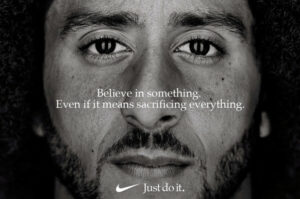Ethical consumerism and the power of the millennial pound
According to the headlines (and backed up by recent studies) millennials are killing industries: the divorce industry, the diamond industry, and the oil industry, to name a few. For young consumers, it is appears that ethics trumps other concerns when looking for brands to support. This impacts where they invest, what they watch and where they work, with 14% of millennials saying they would not want to work in the oil and gas industry, the highest of any sector.

Nike’s Colin Kaepernick campaign saw a 3% dip in its share price, which would initially appear to be a red flag for the brand. However, a closer look reveals that whilst share prices fell overall, uptake of shares by younger consumers increased drastically. This can only be seen as a positive thing for Nike – this increase in younger shareholders is effectively a rebranding in itself, positioning Nike as a brand that cares about political issues and is willing to take a stand. According to Howe Burch, Reebok’s former head of marketing, “Nike cares most about the category influencers and tastemakers — nearly all of whom will embrace their decision. They know they will lose some customers short-term but not the kind of customers that really drive their business.”
The ethical practice of younger consumers is having an impact across the media space. Outcry over a recent clothing collaboration between brands LPA and Revolve led to the collection being pulled from sale. The collaboration was planned to “highlight the impact of cyber-bullying and raise money for charity” by using abusive comments directed towards celebrities including Cara Delevingne and Paloma Elsesser. This plan, in part thanks to bad marketing, backfired, with both consumers and Elsesser calling for the collection’s removal. The company also issued an apology from the brand and donated $20,000 to Girls Write Now.
However, young voices don’t always have this power. Prior to release, Netflix’s Insatiable drew widespread and well-publicised criticism of its depiction of disordered eating, including a petition with nearly quarter of a million signatures. Far from cancellation, Netflix has already ordered a second series of the program. Netflix has also faced criticism for its portrayals of mental health and teenage behaviour in 13 Reasons Why and Sierra Burgess Is A Loser. So far, this criticism doesn’t appear to be impacting Netflix’s bottom line or choice of output.
Increasingly, ethical young consumers are becoming ethical young entrepreneurs. Founded in 2014 by university students, Catching A Fish In Norway is a streetwear brand aimed at featuring work of young artists and illustrators. The brand is proudly “90% carbon neutral”, working with Fair Wear Foundation to source its pieces.
Ethical consumerism is not by any means new. The magazine Ethical Consumer was launched in 1989 and continues to produce ratings of the most ethical and unethical companies. However, the reaction to Nike, Netflix and Revolve demonstrate that the young consumers voice is getting louder as their buying capabilities increase.
Of course, these brands have good commercial reasons to cater to this audience. They realise that the life-time value of a young consumer is many times that of a customer who comes to your brand late in life, just as banks have always understood that the student demographic is a highly attractive target because people form habits early.
Besides, the troubles faced by long-standing high street institutions like House of Fraser and John Lewis, and media brands like The Daily Telegraph and the Express, illustrate the danger of appealing only to an older demographic. Brands need to attract young consumers in order to survive, and if ethical concerns are driving young people’s behaviour, brands would be foolish not to cater to them.
josephine@trippassociates.co.uk
Martin Tripp Associates is a London-based executive search consultancy. While we are best-known for our work across the media, information, technology, communications and entertainment sectors, we have also worked with some of the world’s biggest brands on challenging senior positions. Feel free to contact us to discuss any of the issues raised in this blog.